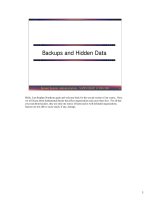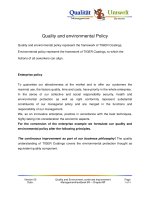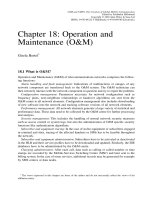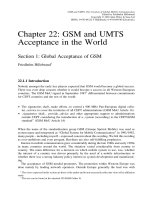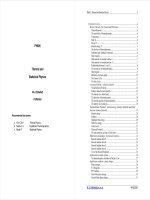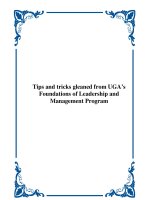Tài liệu Tips and tricks gleaned from UGA’s Foundations of Leadership and Management Program doc
Bạn đang xem bản rút gọn của tài liệu. Xem và tải ngay bản đầy đủ của tài liệu tại đây (113.75 KB, 24 trang )
Tips and tricks gleaned from UGA’s
Foundations of Leadership and
Management Program
Business Skills -- Do's and Don'ts
for More Professional Speaking
and Writing
Tips and tricks gleaned from UGA’s
Foundations of Leadership and
Management Program
Business Skills Quiz
1. Sixty-seven percent of first impressions are true.
> true
> false
2. A firm handshake is only offered to a businessman, not a business
woman.
> true
> false
3. How long should a business sentence and business paragraph be?
a. A business sentence should be no more than 15 to 20 words and a
business paragraph no more than 7 to 9 lines.
b. A business sentence should be no more than 3 to 5 words and a
business paragraph no more than 2 to 3 lines.
c. A business sentence should be no more than 4 to 6 words and a
business paragraph no more than 3 to 4 lines.
d. A business sentence should be no more than 8 to 9 words and a
business paragraph no more than 5 to 6 lines.
Business Skills Quiz
4. It is ok to shake hands with someone while seated.
> true
> false
5. What should be the first thing you think about when
beginning any written communications?
a. The content.
b. The format of the content.
c. The reader.
d. The size font to use.
6. What kind of notes should you prepare prior to speaking to your
audience?
a. Lengthy notes describing everything you are going to say.
b. A key-word outline, using the fewest words possible.
c. Notes in paragraph forms.
d. It is not necessary to prepare notes prior to speaking.
Business Skills Quiz
7. What does a speaker do with his/her hands for the most energy and
sense of professionalism?
a. A speaker should keep hands clasped behind their back.
b. A speaker should keep hands clasped in the front of their body.
c. It is best to keep hands above the waist.
d. A speaker should speak with their hands at their side.
8. What is the best way to rehearse prior to a presentation?
a. Don't rehearse. Instead, look at your outline, think through what
you want to say and give your presentation.
b. Rehearse for at least 30 minutes prior to your presentation.
c. Rehearse for at least one hour prior to your presentation.
d. Rehearse for at least 15 minutes prior to your presentation.
9. Most people understand when you have call waiting and must take
another call.
> true
> false
Business Skills Quiz
10. It is polite to recap and welcome latecomers to meetings.
> true
> false
11. When you arrive at a professional function and you know no one in
the room, what should you do?
a.Head straight for the food table – you don’t have to talk when your
mouth is full.
b.Look for a large group gathered around a central speaker and attach
yourself to it.
c.Stand on the fringe of the crowd and observe.
d.Look for a small group – 2 or 3 persons – and join it.
12. It is okay to use all uppercase characters in an email if you are trying
to make a point.
> true
> false
Business Skills Quiz
13. An email sent to thank a professional contact for some service should
begin with the words ‘Thank you for…’.
> true
> false
14. The safest comfort zone for most people (distance-wise) is 3-6 feet.
> true
> false
15. Use the pronoun ‘I’ liberally in business
communications – it makes it more personal.
> true
> false
Business Skills Quiz
16. Which of the following is not a poor professional use of email?
a. It is okay to reprimand someone by email.
b. You can send greeting cards to people at work for holidays or
birthdays.
c. It’s quicker to email the person just down the hall rather than call
or visit them.
d. Re-read each email before you hit the send button.
17. Exchange business cars at the beginning of the meeting.
> true
> false
18. The subject line of an email should always be specific.
> true
> false
Business Skills Quiz
19. No one will notice a slight spelling, grammar, or punctuation mistake
in your business writing.
> true
> false
20. Using emotional words such as hope, feel, and believe will make
your business correspondence have more impact on the reader.
> true
> false
That’s all! Now don’t you feel smarter?

